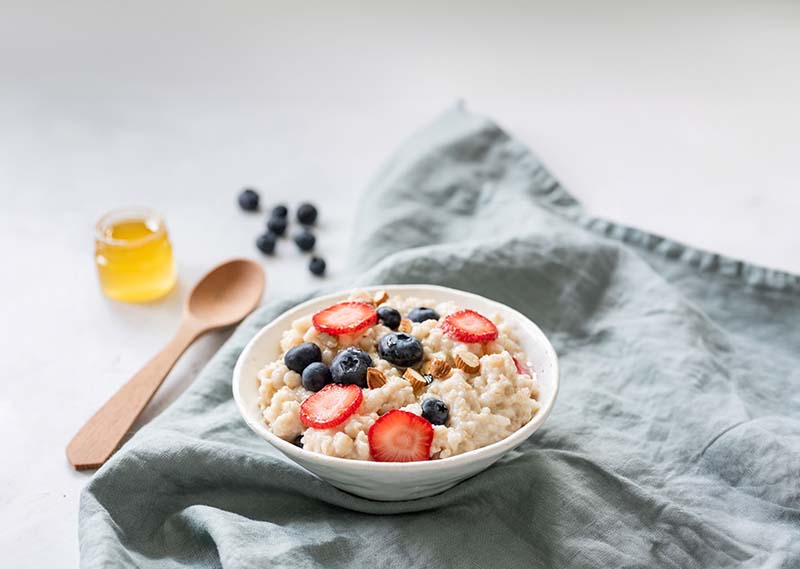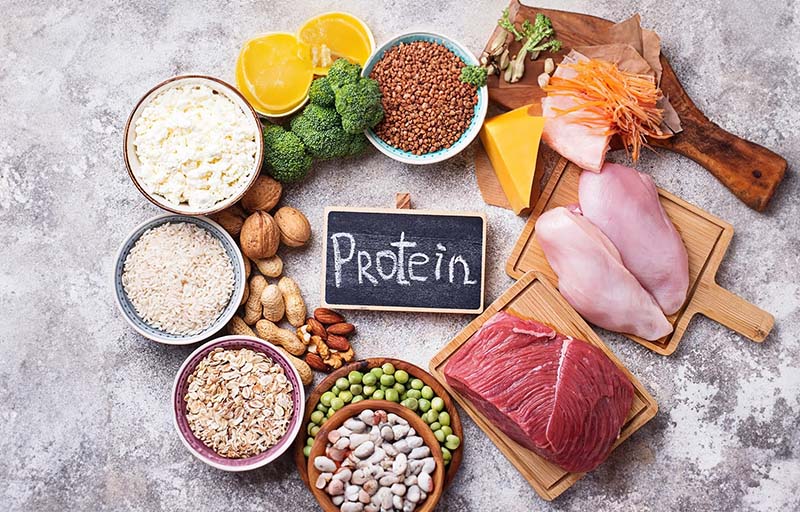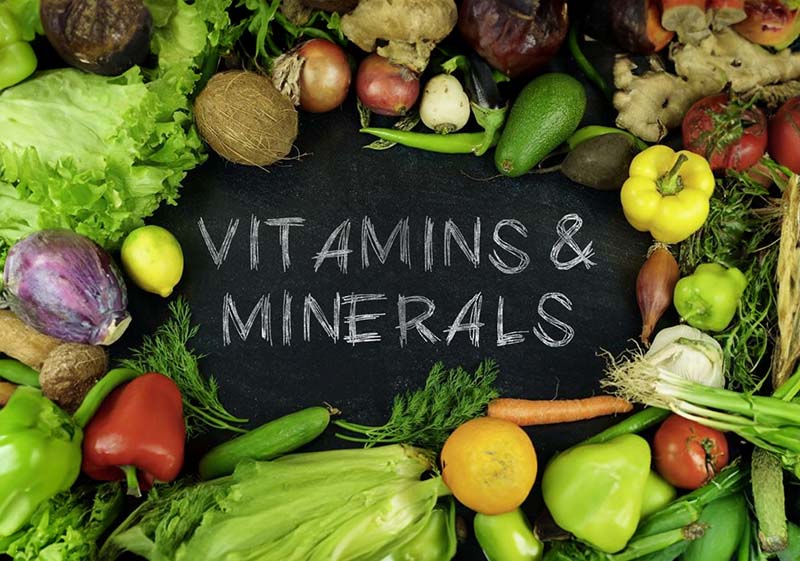Every day, we face the challenge of deciding what to have for breakfast. Whether it’s a rushed morning or a leisurely start to the day, our breakfast should meet a few essential criteria: it should provide us with healthy energy and essential nutrients to kickstart our day.
One breakfast option that ticks all the boxes is the humble yet versatile oatmeal. It’s a convenient, speedy choice with a plethora of health benefits. In this discussion, we’ll explore the pivotal question, “Does Oatmeal Help with Weight Loss?” and why oatmeal deserves a spot on your breakfast menu, enhancing your mornings and overall well-being.
Read more
- Is Salmon Good for Weight Loss? Discover the Surprising Benefits!.
- Does Spinach Help You Lose Weight? Insights and Tips.
- Are Sweet Potatoes Good for Weight Loss? Exploring the Reality.

Is Oatmeal Good for Weight Loss?
Oatmeal has been in the spotlight as a potential helper in the quest to shed those extra pounds. Let’s break down the science and evidence behind its weight loss benefits in simpler terms.
- Staying Full Longer: A study published in the Journal of the American College of Nutrition showed that eating oatmeal for breakfast has a notable advantage. People who had oatmeal in the morning reported feeling full for a longer time compared to those who went for regular cereal. This longer-lasting fullness might be a key factor in eating fewer calories throughout the day.
- The Fiber Power: Oatmeal contains a special type of fiber called beta-glucan. In 2016, a study in the Journal of Nutrition found that this fiber plays a significant role in making you feel full. This means it helps with better weight management. In simple terms, beta-glucan helps you feel satisfied, making it easier to control how many calories you eat.
- A Weight Loss Supporter: These findings suggest that having oatmeal as part of your daily breakfast routine could potentially help with your weight loss efforts. However, it’s important to note that oatmeal alone won’t perform miracles. Successful weight loss ultimately comes down to a basic principle: burning more calories than you consume. To see significant changes in your weight, you need to maintain a calorie deficit.
Notes:
- Oatmeal is a versatile food that you can jazz up with various toppings like fruits, nuts, and seeds. This not only adds flavor but also boosts its nutritional value, all while being mindful of your weight.
- To make your oatmeal breakfast even more satisfying and balanced, try adding a source of lean protein, like Greek yogurt or almond butter. This can help control your hunger even better.
- Keep in mind that while oatmeal can be a helpful addition to your diet, your overall food choices and physical activity level are crucial factors in a successful weight loss journey. For the best results, include oatmeal as part of a well-rounded, calorie-controlled diet.
Nutritional Facts of Oatmeal
Oatmeal is a nutritional powerhouse, offering a well-balanced mix of essential nutrients. Here’s a breakdown of its key nutritional components:
Carbs and Fiber
Oats are a great source of carbohydrates and pack a punch when it comes to dietary fiber, particularly beta-glucan. This fiber is known for its numerous health benefits, including aiding in digestion and supporting heart health.

Protein
Oats also provide high-quality protein with a good balance of essential amino acids. Protein is vital for various bodily functions, including muscle repair and immune system support.

Vitamins and Minerals
Oats are rich in essential vitamins and minerals that contribute to overall health. A half-cup (40.5 grams) of dry oats contains significant amounts of manganese, phosphorus, magnesium, copper, iron, zinc, folate, vitamin B1 (thiamin), and vitamin B5 (pantothenic acid). It also contains smaller amounts of calcium, potassium, vitamin B6 (pyridoxine), and vitamin B3 (niacin).

Caloric Content
One cup of prepared oatmeal (made from half a cup of dry oats mixed with water) provides approximately 27.4 grams of carbohydrates, 5.3 grams of protein, 2.6 grams of fat, 4 grams of fiber, and around 153.5 calories. This makes it a filling and nutritious option for breakfast or any meal.

Why Oatmeal is Beneficial for Weight Loss?
Oatmeal is a nutritious ally in your weight loss journey, and here’s why it can make a difference:
- Complex Carbohydrates and Fiber: Oatmeal is rich in complex carbohydrates and boasts an abundance of fiber, particularly a soluble type known as beta-glucan. This unique fiber creates a gel-like consistency in your digestive system, slowing down the stomach’s emptying process and the absorption of glucose. This slowdown effectively curbs your appetite and triggers a sense of fullness, resulting in extended satisfaction and reduced calorie consumption.
- Nutrient Density: Oatmeal is a nutrient-dense food, meaning it’s packed with essential vitamins, minerals, and beneficial compounds. It’s not just about weight loss; oatmeal can also contribute to improved overall health. For example, it has been linked to lower blood cholesterol levels. Remember, weight loss occurs when your body burns more calories than it takes in, so anything that supports increased calorie expenditure or reduced calorie intake can facilitate weight loss.
However, keep in mind that the impact of oatmeal on weight loss isn’t a one-size-fits-all solution. It hinges on various factors, including your overall dietary choices and lifestyle. It’s also crucial to opt for less processed oatmeal varieties and be mindful of added sugars to reap the full benefits of this nutritional powerhouse.

Advantages of Including Oatmeal in Your Diet
Oatmeal offers a range of benefits that can positively impact your health. Here are the advantages of including oatmeal in your diet:
Sustains Feeling of Fullness
Oatmeal, being a complex carbohydrate rich in fiber, notably beta-glucan, forms a gel-like substance in your digestive system. This gel slows down stomach emptying and glucose absorption, regulating your appetite and providing a sustained feeling of fullness. This can aid in weight management and overall well-being.
Lowers Heart Disease Risk
Oatmeal contains soluble fiber, specifically beta-glucan, which has been linked to reducing both total and LDL cholesterol levels, important risk factors for heart disease. Beta-glucan prevents cholesterol absorption in the gut. Oats also contain antioxidants like avenanthramides that reduce inflammation and promote better heart health.

Accessible and Healthy Grain Choice
Oatmeal is a versatile, widely available whole grain that easily fits into a balanced diet. It’s a good source of essential nutrients like manganese, phosphorus, magnesium, and iron. Oats are also rich in antioxidants, such as avenanthramides, which possess anti-inflammatory and anti-itch properties, contributing to overall well-being.
Improves Skin Health and Strengthens Immunity
Colloidal oatmeal, finely ground oats, is FDA-approved for skin protection. Oats contain bioactive compounds, including avenanthramides, with anti-inflammatory and antioxidant properties that benefit skin health. Furthermore, oatmeal’s beta-glucan enhances immune responses, potentially bolstering immunity and overall health.

Balances Gut Microbiome
The soluble fiber in oatmeal, especially beta-glucan, acts as a prebiotic, nourishing beneficial gut bacteria. This fosters a healthy balance in the gut microbiome, crucial for digestion, nutrient absorption, and overall gut health. By supporting the growth of good bacteria, oatmeal contributes to a healthy gut environment and overall well-being.
Potential Downsides to Regular Oatmeal Consumption
While oatmeal is generally a healthy choice, it can have some downsides, particularly when consumed in excess or if not introduced gradually into your diet. Here are some potential issues to be aware of:
- Stomach Swelling: Although not common among healthy adults, consuming oats can lead to gastric swelling, especially if there’s a sudden increase in your dietary fiber intake. This can result in abdominal cramps, discomfort, and flatulence. To avoid this, gradually increase your oat consumption to allow your intestinal flora to adjust. Start with a smaller amount and gradually work your way up to your desired intake. It’s also a good idea to consume finely ground oats or those mixed with digestive enzymes to ease digestion. Soaking oat flakes overnight can also help buffer the acidity of the grains, making digestion smoother.
- Gas Accumulation: Oats are rich in both soluble and insoluble fiber, making them susceptible to causing gas accumulation, which can lead to bloating and stomach discomfort. To mitigate this issue, consider these approaches:
- Add oats to your diet gradually, increasing your daily intake of dietary fiber from 55 grams to 85 grams over ten days. This gradual approach allows your body to adapt.
- Properly soak oats to denature proteins that may be harder to digest.
- Consider using digestive enzyme products available in specialty stores.
- If gas production becomes problematic, you can use over-the-counter simethicone products to help reduce flatulence by merging gas bubbles.
Note:
It’s essential to listen to your body and adjust your oatmeal consumption based on how your digestive system responds. Moderation and gradual changes in your diet can help you enjoy the benefits of oatmeal without experiencing these potential downsides.
How Much Oatmeal Should I Eat to Lose Weight?
To support weight loss with oatmeal, it’s typically recommended to consume a serving size of approximately 30-40 grams, which is equivalent to about 1/3 to 1/2 cup of dry oats. This portion size provides a balance of carbohydrates, fiber, and protein, helping you stay fuller for longer and regulating your appetite throughout the day.
It’s important to note that individual calorie needs vary based on factors like age, gender, activity level, and metabolism. Therefore, it’s advisable to incorporate this oatmeal serving into a well-rounded, calorie-controlled diet that aligns with your specific weight loss goals.
Additionally, you can customize your oatmeal with healthy toppings like fresh fruits, nuts, or seeds to enhance its flavor and nutritional value while still being mindful of overall calorie intake. Balancing your oatmeal with other nutrient-dense foods and regular physical activity will contribute to a successful weight loss journey.
Conclusion
In conclusion, addressing the question “Does Oatmeal Help with Weight Loss?”, we can affirm that oatmeal can indeed be a valuable asset on your weight loss journey. Its fiber-rich goodness promotes satiety and overall health. But we want to hear from you! Share your oatmeal success stories and tips with us. And for more insightful articles on health and wellness, dive into our Sure Life Health blog.
Discover how oatmeal can truly make a difference in your quest for a healthier you, particularly in your weight loss efforts.
Professor Gaye Cunnane, PhD, MB, FRCPI
As the Director of Health and Wellbeing at RCPI, Professor Gaye Cunnane is at the helm of initiatives aimed at enhancing the health and well-being of RCPI Trainers and Trainees. Her role extends beyond administration; she is also a respected clinical professor of rheumatology and a consultant rheumatologist at Trinity College Dublin (TCD) and St James’s Hospital. Prof. Cunnane’s medical journey began at TCD, where she graduated from medical school, and her path has been marked by both clinical and academic excellence.
After completing her basic clinical training in medicine, she embarked on PhD studies at University College Dublin and St Vincent’s University Hospital. Her research during this period was focused on prognostic markers in early inflammatory arthritis, a project that saw her collaborating with esteemed universities across Europe, including in Switzerland, The Netherlands, the UK, and Sweden.
Prof. Cunnane’s career took her to the University of California, San Francisco, where she spent three years delving into research on new treatments for lupus. Her academic prowess led her to the University of Leeds in 2001 as a senior lecturer, before returning to Ireland in 2003 to assume her current roles. She has also served as the National Specialty Director for Rheumatology training in Ireland, Programme Director for Basic Specialist Training with RCPI, and as a past President of the Irish Society for Rheumatology.
PUBLISHED ARTICLES
“Rheumatic disease differentiation using immunoglobulin G sugar printing by high-density electrophoresis”: Published in The Journal of Rheumatology, this study reflects her in-depth investigation into rheumatic diseases.
“Benefits of exercise in patients with rheumatoid arthritis: a randomized controlled trial”: This research work, highlighting the positive impact of exercise on rheumatoid arthritis, underscores Prof. Cunnane’s dedication to practical, patient-centered research.
Additionally, Prof. Cunnane has made notable contributions to the Annals of the Rheumatic Diseases, discussing early referral, diagnosis, and treatment of rheumatoid arthritis. She has also been involved in a study on the NCBI platform investigating exercise benefits in rheumatoid arthritis patients.
Professor Gaye Cunnane’s career is a testament to her commitment to improving patient outcomes in rheumatology through rigorous research, clinical excellence, and dedicated teaching. Her work continues to influence the field of rheumatology, both in Ireland and internationally.

